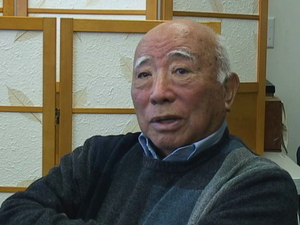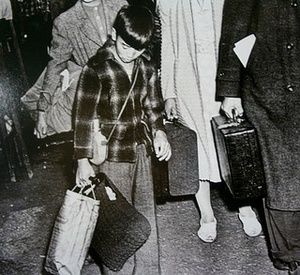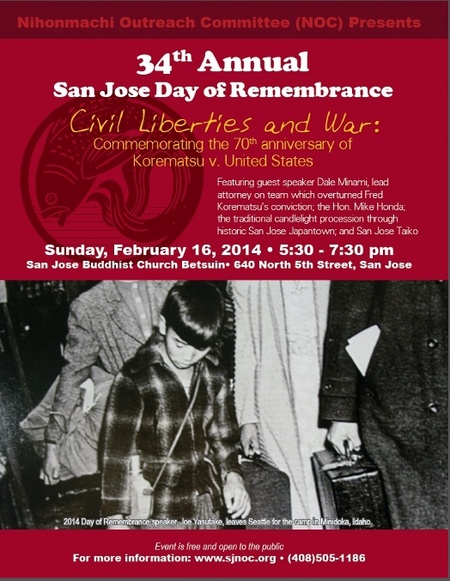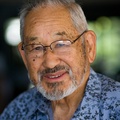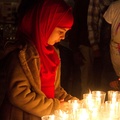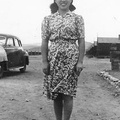The 2014 San Jose Day of Remembrance will be held on February 16, 2014. This year’s event features speakers: Dale Minami, the lead attorney on the legal team that overturned the conviction against Fred Korematsu, who defied the World War II Japanese American mass incarceration order which led to the controversial United States Supreme Court case, Korematsu v. United States; Congressman Mike Honda; and JAMsj former president and current board member, Joe Yasutake.
* * *
Featured Speaker: Joe Yasutake
Joe Yasutake has been one of the key contributors in shaping the vision of the Japanese American Museum of San Jose (JAMsj) and San Jose Japantown. Although Joe and his family were incarcerated in Japanese American internment camps during WWII, only relatively recently has Joe became involved in telling his story, as well as the stories of other Japanese Americans.
“I don’t ever remember talking about the camps,” Joe recalled. “It never came up. When I left camp and returned to school, I didn’t interact with the other Japanese American students who tried to recruit me into their Nisei clubs. Now looking back on it, I think subconsciously I was in denial.”
It wasn’t until Joe moved to San Jose did he revisit his past. Ken Iwagaki, a JAMsj founder, asked Joe if he could speak to a high school class about his internment experience. “I didn’t know anything about it,” Joe recalled. “I never thought about it so I had to do a quick study. It was during that time I really got interested.”
Joe has a special story to tell since his father, Jack Yasutake, was a first-generation Japanese immigrant (Issei) who served as an interpreter for the U.S. government’s immigration department at the time of the Japanese attack on Pearl Harbor. Jack was taken into custody immediately after the attack. “He must have been one of the first Issei men who were picked up,” Joe stated. “Through the Freedom of Information Act, we obtained a file that is about a foot thick. It was clear that the government had been tracking him since about 1936.”
Joe was 9 years old when the FBI came to imprison his father, and he clearly remembers that day. “It was a Sunday, and we (the children) had just come back home from church while my mother had stayed back to do something. This could not have been more than a few hours after Pearl Harbor. Four large men came to our door, and we told the FBI men that my father was at a poetry reading event. Two men left to go there, and the other two searched our house. My mother then came home and was alarmed. She started to speak Japanese, and they kept yelling at her, ‘Speak English. Don’t speak Japanese!’”
The visit by the FBI was a very frightening experience for young Joe. “It was very traumatic,” Joe remembered. “We used to have a great big console radio, and they took that away because it had a short-wave band on it. I remember that because all of a sudden I lost my communication with the Lone Ranger, Jack Armstrong, and all of those people.”
Joe’s father was taken into custody at the poetry reading event. Ironically, he was detained in a cell in the same immigration building where he used to work. His coworkers tried to help him. “In fact, my name Joseph came from one of my dad’s colleagues. They really stuck up for him from the very beginning. They would let my mother know exactly what was going on almost on a daily basis. We saw the letters that they wrote on my father’s behalf to try to get him out.”
Jack Yasutake was eventually incarcerated in various Department of Justice camps. Because of his English communication skills, he would become the spokesman for the other inmates at all of the camps. Ironically, he also wrote letters for the illiterate camp guards to their families.
Joe, his mother, and his three older siblings were also incarcerated in the Puyallup Assembly Center in western Washington and in the Minidoka War Relocation Authority camp in Idaho. Since their father was imprisoned separately in higher-security camps, communication with him was difficult. Joe recalled, “We used to get letters that were about three paragraphs long, and everything was blacked out. You couldn’t see anything but the signature of the sender. There was definitely heavy censorship going on.”
While Joe was in the Minidoka camp, his older siblings engaged in many serious discussions about their family’s future. Joe overheard some of their secretive discussions when they thought he was sleeping. Joe’s oldest brother and sister planned to leave the camp to attend school near Cincinnati, Ohio, while his other brother joined the famed 442nd Regimental Combat Team in Europe. Young Joe heard that his older brother decided to join the U.S. Army, thinking that his action would help gain their father’s release. “Unfortunately and fortunately, he was wounded in battle,” Joe remarked. “He was wounded a week or two before the famous ‘Lost Battalion’ battle, but he was in the hospital. His replacement and most of his unit were killed.”
Joe and his mother were finally able to reunite with their father when they transferred to the Crystal City Department of Justice camp in Texas. Towards the end of the war, Joe and his parents were released. They moved to Chicago, where Jack would eventually become the executive director of the Chicago Resettlers Committee, an agency that assisted former Japanese American internees to restart their lives.
Although Joe didn’t feel the need to talk about his wartime experience in earlier years, now he feels compelled to tell his story. “We really need to keep aware of this because of the state of our country,” Joe said. “There are things that are going on today that are just as relevant as seventy years ago. It is very important that people do not forget what happened.”
* * *
The San Jose Day of Remembrance event will be held on Sunday, February 16, 2014 from 5:30 p.m. to 7:30 p.m. at the San Jose Buddhist Church Betsuin, located at 640 N. Fifth Street, San Jose, California 95112. For more information about the San Jose Day of Remembrance, visit www.sjnoc.org.
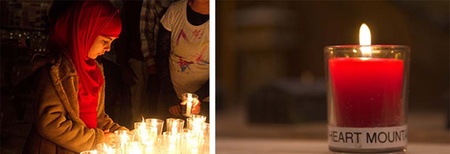
Day of Remembrance candlelight ceremony (left) honors internees, war veterans, and people who were displaced by E.O. 9066. San Jose Day of Remembrance brings multiple communities together to build trust, respect, and understanding. Photo courtesy of Andy Frazer.
*This article was originally published on the JAMsj Blog on January 11, 2014.
© 2014 Will Kaku


